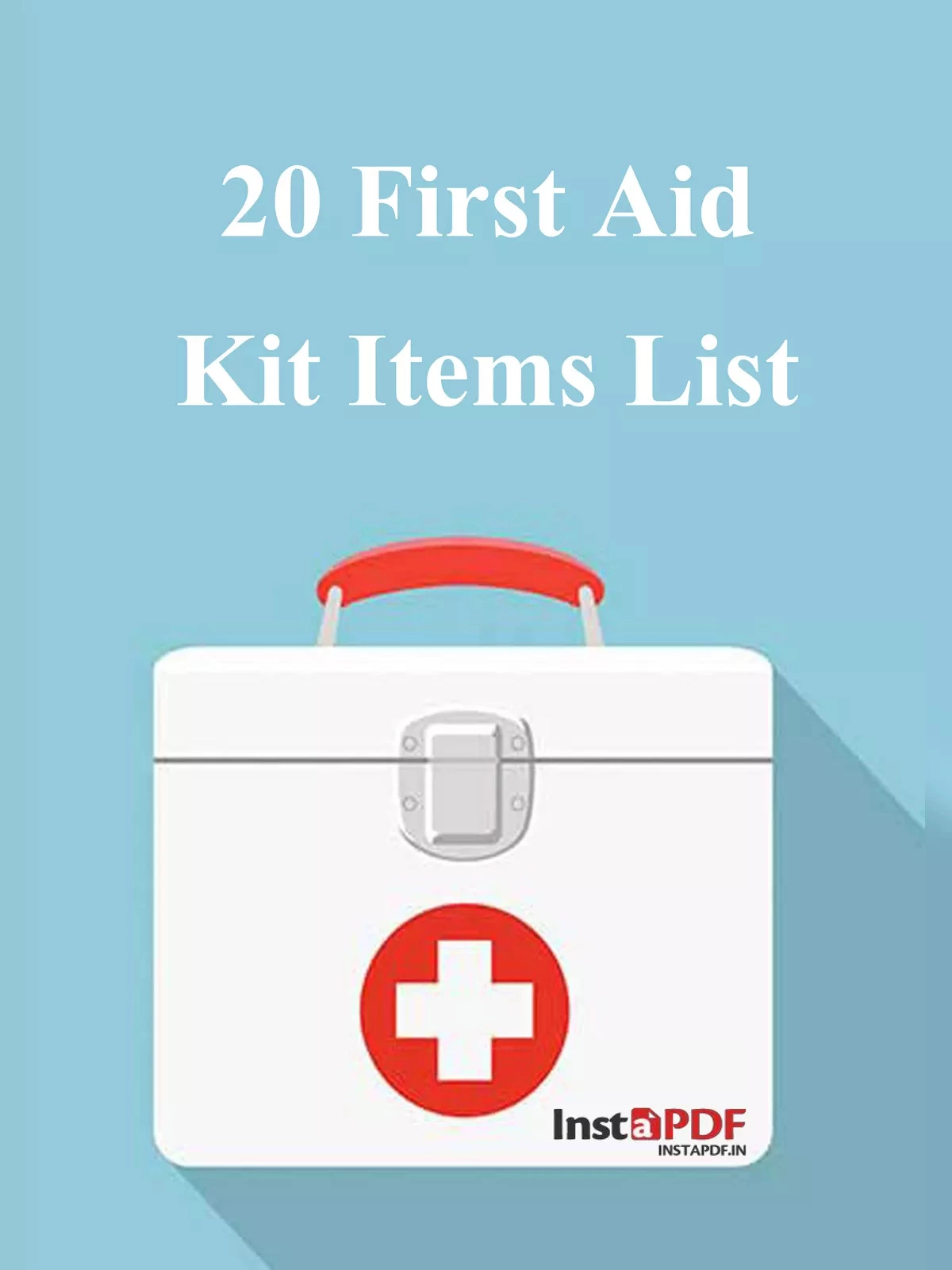
List of Items in First Aid Box
First Aid Kit or Materials: Everyone should always keep a first-aid kit in their home. All the materials of first aid should be kept within easy reach of an adult but should be stored away from children. Having a well-stocked first-aid kit is essential to ensuring the right supplies to deal with an emergency at a moment’s notice.
A typical first aid kit contains at least 20 materials and everyone should also know their uses.
First-aid kits or the individual first aid materials can be purchased at a local drugstore or you can put one together yourself. If you make the decision to make one yourself, chose a container that is spacious and easy to open and carry. Plastic tackle boxes, for example, make great homemade first-aid kit containers.
20 Items in a First Aid Kit
- A first-aid manual
- Different sized sterile gauze pads
- Adhesive tape
- Band-Aids in several sizes
- Elastic bandage (like an Ace wrap)
- Antiseptic wipes
- Antibiotic ointment
- Antiseptic solution (like hydrogen peroxide)
- Acetaminophen and ibuprofen
- Tweezers
- Scissors
- Disposable instant cold packs
- Alcohol wipes
- Plastic non-latex gloves
- Flashlight with extra batteries
- A blanket
- Mouthpiece for administering CPR (can be purchased at the drugstore)
- Calamine lotion
- A splint
- Thermometer
20 First Aid Materials and Their Uses (20 First Aid Materials and Their Uses)
- An antiseptic: To remove any dirt and debris and prevent infection after a minor injury.
- Adhesive bandage: Accidents happen. Even if you aren’t someone who bumps into things all the time, or have kids, waterproof Band-aids or Hansaplast can come in quite handy in a variety of situations. Case in point: shoe bite.The bandage will prevent your clothes (or shoes) from rubbing against your wound and keep it dry at the same time.
- Gauze dressing: Yes, they are a bit old-fashioned. But they’re just as versatile as they were in your parents’ time.
- Crêpe bandages: For sprains and sympathy.
- Safety pins: Two reasons: safety pins are versatile – they come in handy for wardrobe emergencies, too; and when you break the clasp on your crêpe bandage, you’ll need a safety pin to keep the bandage in place.
- Tweezers: Don’t go trying to remove a splinter with that safety pin, now. Use tweezers. And if it looks like the splinter is in too deep, don’t try to remove it yourself, go to a doctor. A good pair can help you get those eyebrows looking on fleek.
- Scissors: This one’s self-explanatory, we think. Just be careful not to cut yourself. And maybe get a babyproof one if you have young children in the house – gauze isn’t that hard to cut.
- Cotton balls and cuties: Make sure to put them in a clean box within your first-aid box. You won’t be doing anyone any favours by using dirty cotton.
- A thermometer: Because you can’t always use the back of your hand to tell when you’re running a temperature. If you have babies at home, this one’s a must.
- Mosquito patch or cream or spray: To keep five things at bay: dengue, malaria, chikungunya, itchy bites and sleepless nights.
- Antiseptic cream: For cuts and scrapes that don’t need a bandage. Apply, and forget.
- Painkillers: Worldwide, headaches and backaches are among the most common reasons why people miss a day of work – keep an appropriate medicine or spray handy.
- Pain reliever spray, gel or balm: Pain can get in the way of a good night’s sleep. For muscle sprain and back pain, pain reliever spray, gel or balm can ease the discomfort immediately. Yes, you need the spray as well as the painkiller medicine.
- Antihistamines: To stop the sniffles if you’ve got allergies, as well as for any allergies you haven’t discovered yet.
- Paracetamol: Be sure to stock up on baby paracetamol if you have kids.Regular paracetamol is also a mild painkiller.
- Antacid: Indigestion is more common – and uncomfortable – than anyone would like. A sachet of Eno, a Digene tablet or antacid syrup can help if you’re at a pinch. Don’t make a habit of it, though. Antacids can harm the kidneys.
- Eyewash or artificial tears: In case your eyes feel gritty or dry after a whole day of looking at the computer screen or because of the polluted air.
- Pad and/or tampons: Just for emergencies, and there are many when it comes to periods. Keep a few pads handy, until you can get to a drugstore.
- Gel for ulcers and toothache: A toothache can hit at any time, without any warning or provocation.
- Hot water bottle: Not every pain demands to be dealt with pills. Keep a hot water bottle handy for milder aches.
- Air-pollution masks: For when the air turns foul again. The simple, inexpensive N-95 or N-99 mask will do. Either will keep most of the particulate matter in the air out of your lungs.
You can download the 20 First Aid Kit Items List PDF using the link given below.